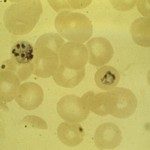Link to Pubmed [PMID] – 1310995
J Cell Biol 1992 Mar; 116(5): 1243-55
The accumulation of two myogenic regulatory proteins, MyoD and myogenin, was investigated by double-immunocytochemistry and correlated with myosin heavy chain expression in different classes of myoblasts in culture and during early myogenesis in vivo. During in vitro differentiation of fetal myoblasts, MyoD-positive cells were detected first, followed by the appearance of cells positive for both MyoD and myogenin and finally by the appearance of differentiated myocytes and myotubes expressing myosin heavy chain (MHC). A similar pattern of expression was observed in cultures of embryonic and satellite cells. In contrast, most myogenic cells isolated from newly formed somites, expressed MHC in the absence of detectable levels of myogenin or MyoD. In vivo, the appearance of both myogenin and MyoD proteins was only detected at 10.5 d postcoitum (d.p.c.), when terminally differentiated muscle cells could already be identified in the myotome. Parasagittal sections of the caudal myotomes of 10.5-d-old embryos showed that expression of contractile proteins preceded the expression of myogenin or MyoD and, when coexpressed, MHC and myogenin did not co-localize within all the cells of the myotome. In the limb bud, however, many myogenin (or MyoD) positive/MHC negative cells could be observed in the proximal region at day 11. During further embryonic development the expression of these proteins remained constant in all the muscle anlagens examined, decreasing to a low level during the late fetal period. Western and Northern analysis confirmed that the myogenin protein could only be detected after 10.5 d.p.c. while the corresponding message was clearly present at 9.5 d.p.c., strongly suggesting a posttranscriptional regulation of myogenin during this stage of embryonic development. These data show that the first myogenic cells which appear in the mouse myotome, and can be cultured from it, accumulate muscle structural proteins in their cytoplasm without expressing detectable levels of myogenin protein (although the message is clearly accumulated). Neither MyoD message or protein are detectable in these cells, which may represent a distinct myogenic population whose role in development remains to be established.

